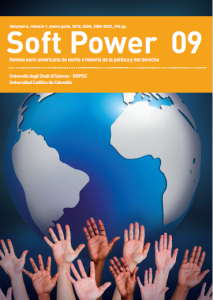Abstract
This paper focuses on the connection between an inclusive idea of citizenship and the real concept of democracy. A good definition of democracy stresses the basic principle of autonomy, and an adequate notion of autonomy implies the double face of it: the public and the personal one. Hannah Arendt’s reflection on statelessness plays a paradigmatic role in this political and philosophical perspective on citizenship. Through Arendt’s analysis, the article tries to show the essential nature of the relationship between democracy and inclusive citizenship
Keywords

References
Agier, M. (2008). On the Margins of the World. The Refugee Experience Today. Malden/MA: Politiy Press.
Agier, M. (2011). Managing the Undesirables. Refugee Camps and Humanitarians Government. Cambridge: Polity Press.
Andrews, G. (Ed.) (1991). Citizenship. London: Lawrence and Wishart.
Arendt, H. (1972). On Violence. In Crisis of the Republic (pp. 103-198). San Diego-New York-London: Harcourt Brace & Co.
Arendt, H. (1979). The Origin of Totalitarianism (new edition with added Prefaces). San Diego-New York-London: Harcourt Brace & Co.
Arendt, H. (1998).The Human Condition (Introduction by M. Canovan (Ed.)). Chicago-London: Chicago University Press.
Arendt, H. (2003). Was ist Politik?: Fragmente aus dem Nachlaß. München: Piper Taschenbuch
Balibar, É. (2010). Arendt, le droit aux droits et la désobéissance civique. In La proposition de l’égaliberté (pp. 201-227). Paris: Puf.
Barbelet, J. M. (1989). Citizenship. Minneapolis: University of Minnesota Press.
Benhabib, S. (Ed.) (1996). Democracy and Difference. Princeton: Princeton University Press.
Birmingham, P. (2006). Hannah Arendt and Human Rights. The Predicament of Common Responsibility. New York: Indiana University Press.
Brożek, B. (2013). Philosophy and Neuroscience. Three Modes of Interaction. In J. Stelmach, B. Brożek & Ł. Kurek (Eds.). Philosophy in Neuroscience. Krakow: Copernicus Center Press.
Carens, J. H. (2013). The Ethics of Immigration. Oxford: Oxford University Press.
Castelfranchi, C. (2014). NeuroNorme: per un approccio non riduzionista. Cosa cercare e non cercare nel cervello. Rivista di filosofia del diritto, III, n.s.
Castoriadis, C. (1975). L’institution imaginaire de la société. Paris: Le Seuil.
Cohen, J. & Sabel, C. (1997, May). Directly-Deliberative Polyarchy. European Law Journal, 3(4), pp. 313-342.
Cole, P. & Wellman, C. H. (2011). Debating the Ethics of Immigration. Is There a Right to Exclude? Oxford: Oxford University Press.
Dworkin, R. (1993). Life’s Dominion. An Argument about Abortion, Euthanasia and Individual Freedom. New York: Alfred A. Knopf.
Goldoni, M. & Maccorkindale, C. (2012) (Eds.). Hannah Arendt and the Law. Oxford-Portland/NY: Hart.
Greblo, E. (2017). Luoghi a perdere. Hannah Arendt e la questione dei rifugiati. Scienza & Politica, 29(57), pp. 195-212.
Dewey, J. (1954). The Public and its Problems. Chicago: Swallow Press.
Habermas, J. (1992). Between Facts and Norms. Contributions to a Discourse Theory of Law and Democracy. Cambridge/MA: The MIT Press.
Habermas, J. (1996). Three Normative Models of Democracy. In S. Benhabib (Ed.), Democracy and Difference (pp. 21-30). Princeton: Princeton University Press.
Hayden, P. (2009). Political Evil in a Global Age. Hannah Arendt and International Theory. London: Routledge.
Held, D. (1989). Political Theory and the Modern State. Essays on State, Power, and Democracy. London: Polity Press.
Hume, D. (1748). An Enquiry Concerning Human Understanding. II. 3. I. London: A. Millar.
Iacoboni, M. (2008). I neuroni a specchio. Come capiamo ciò che fanno gli altri. Torino: Bollati Boringhieri.
Kant, I. (1785). Grundlegung zur Metaphysik der Sitten. In AA. BD., Kants gesammelte Schriften. IV. 1904, II. (pp. 385-463). Berlin: Hrsg. Von der Koniglich Preusen, Kant, I. (1793). Über den Gemeinspruch: Das mag in der Theorie richtig sein, taugt aber nicht für die Praxis. In AA. BD. Kants gesammelte Schriften VIII, 1912, II. (pp. 273-314). Berlin: De Gruyter.
Kant, I. (1797). Die Metaphysik der Sitten: Der Streit der Fakultäten. London: Forgotten Books (2018).
Kelsen, H. (1929). The Essence and Value of Democracy. N. Urbinati and C. Invernizzi Accetti (Eds.) (2013). Plymouth: Rowman & Littlefield Publishers.
Klabbers, J. (2007, March). Possible Islands of Predictability. The Legal Thought of Hannah Arendt. Leiden Journal of International Law, 20(1), pp. 1-23.
Lalatta Costerbosa, M. (2014). Democrazia assediata. Rome: DeriveApprodi.
Lalatta Costerbosa, M. (Ed.) (2016). Lo spazio della responsabilità. Approdi e limiti delle neuroscienze. Bologna: il Mulino.
La Torre, M. (2004). Cittadinanza e ordine politico. Diritti, cirsi della sovranità e sfera pubblica in una prospettiva europea. Torino: Giappichelli.
La Torre, M. (2013). Hannah Arendt and the Concept of Law. Against the Tradition. Archiv für Rechts-und Sozialphilosophie, 99(3), pp. 400-416.
Lukes, S. (1982). Relativism in Its Place. In S. Lukes & M. Hollis (Eds.), Rationality and Relativism. Oxford: Oxford University Press.
Macready, J. D. (2017). Hannah Arendt and the Fragility of Human Dignity. Lanham/MD: Lexington Books.
McCabe, D. P. & Castel, A. D. (2008, April). Seeing Is Believing. The Effect of Brain Images on Judgements of Scientific Reasoning. Cognition. 107(1), pp. 343-352.
McCabe, D. P. & Castel, A. D. & Rhodes, M. G. (2011). The Influence of FMRI Lie Detection Evidence on Juror Decision Making. Behavioural Sciences and Law, pp. 566-577.
Mill, J. S. (2008). On Liberty and Other Essays. Oxford-New York: Oxford University Press.
Nedelsky, J. (2001). Judgment, Diversity, and Relational Autonomy. In R. Beiner & J. Nedelsky (Eds.), Judgment, Imagination, and Politics. Themes from Kant and Arendt (pp. 103-120). Lanham: Rowman & Littlefield.
Rizzato, M. & Donelli, D. (2011). Io sono il tuo specchio. Neuroni specchio ed empatia. Torino: Edizioni Amrita.










